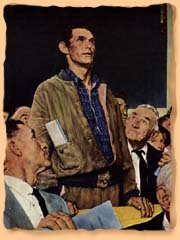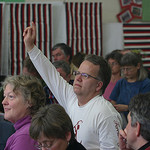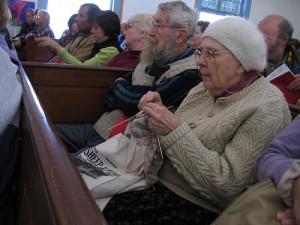Last year in the town that I am proud to call home, fewer than 60 people turned out to vote on the School Budget. Thats not a typo. 60. Out of approximately 1000 registered voters. To discuss and vote on a $1.7m school expenditure budget. Do you really think that your vote doesn’t matter? It does, as well it should. We live in one of the last great places on this planet where your individual vote both makes a huge difference, and may be performed at the lone cost of taking a few hours off from work. In a world where citizens in fledgling Democracies risk their lives to vote, we cannot turn out 10%.
Sadly, the concept of “pure democracy” has morphed and become diluted over time to represent something less than the Framers of our Constitution likely envisioned. The idea that the community came together as a whole to vote on the issues of the day in a fair and open forum quickly became a gathering of the most informed, educated or mobile in a community. Meanwhile the less informed, un-educated, or otherwise immobile stayed home, milked the cows (so to speak) and pondered how the decisions made by others would affect their lives during the foreseeable future.

While the concept of Democracy is still wrought with complications – low voter turn out due to poor public opinion of politicians, a general morose over the value of an individuals single vote in a pool of millions, or simply an inability to take time off from work – in Vermont we have an opportunity each year to participate in a form of Democracy that is quietly and sadly slipping from the collective consciousness.
The immobile have been replaced by those whose work schedule or childcare arrangements interfere with their ability to turn out. Still the more educated generally turn out in higher numbers than the less educated. And there is a constant – a belief that “my vote means nothing” that becomes an excuse for doing something else on the first Tuesday of every March. But this last point is the most important because nowhere is it more critical to have every single voter turn out than in the dwindling phenomenon of the Vermont Town Meeting. In most of our local communities, 10 citizens who regularly attend town meeting rallying just one of their friends who does not, can change one controversial vote, save one exceptional teachers job, or replace a town official whose time in the sun has long since passed.
Would you like to see democracy at its finest? Then Town Meeting Day in Vermont is THE place to start. It’s always held on the first Tuesday in March, and this year that’s March 3rd. In general Town Meetings are small (although everyone would admit they’re too small – read: attendance should be stronger, but it’s not) local gatherings of people interested in the goings on of their town – the political, financial, and the social. It’s when we elect our local officers – all of the important positions: among various other positions we elect:
Selectmen who “guide” the town,
Town Clerks who “run” the town,
Listers who “assess” the town,
Cemetery Commissioners who, well, know where everyone “is”.
Beyond the elections of officers, it’s also your opportunity to have a say in the budget being set forth by those that run your town.
It’s a long tradition in Vermont, and it’s one traditions every town holds near and dear. The first Town Meeting in Vermont was held in Bennington Vermont in 1762, which was in fact held 15 years before our State was even created.

This year across our Valley towns each will be holding their own Town meetings. It seems roads are on hot on agendas in a couple local towns. In Warren, they are looking to spend some money to repave the school parking lot to a tune of $75,000. In Waitsfield, one of the Articles on their Warning reads “Shall the voters authorize the Town to borrow an amount not to exceed $75, 000, to be paid over a period of not more than five years and on such other terms as the Selectboard shall negotiate, for the purpose of paving parts of Joslin hill Road?”. Judging by the letters that have appeared already in the Valley Reporter, this should bring on some “lively” discussion. Waitsfield is also looking to spend some moolah on paving other town roads. Fayston has no roads on the agenda, but is looking to the voters to decide if money paid to the Fayston Elementary school should be raised from $20,000 to $40,000. I’m guessing, like most things related to school funding, this should also generate a hearty debate.
And don’t forget, most of these meetings are held separately from the School portion of Town Meeting. Which is equally important, if not more so when you look at the bottom line – most of the money collected by Valley Town tax bills is for school education – but not for our own schools. And if I’m brave enough, that will be a discussion for another day.
So if you’re a registered voter in Vermont, it is your duty to come out and participate in the discussion or at the very least, cast your vote on the issues at hand. And yes, it’s true that you have to be more than just a homeowner in your town to get a vote – it needs to be your primary residence, and you need to register to vote. BUT don’t let that stop you, if you’re a second homeowner, you should attend to see how your town is being run – voter registration is not a requirement to be able attend, only to vote. AND, most towns provide a potluck lunch to up the social factor – but for that info, you’ll have to contact the Clerk’s office in your town. So, maybe the free food will get you there.

Oh, and if you can’t be there, but are interested – you can follow the tweets of the Valley Reporter (@ValleyReporter) who says they’ll have people sitting in on all the local meetings. Mad River Valley TV will air the meetings some time after they have occurred, so you can see the process in action. Maybe we can get a town challenge going to see who has the most knitters in attendance….
I hope to see you there, if not to discuss real estate or politics, but to share a yarn of a tale during a long steeped Vermont democratic tradition.
Live Vermont, Live Mad River.
Cheers,
Doug
 Recently Sold
Recently Sold